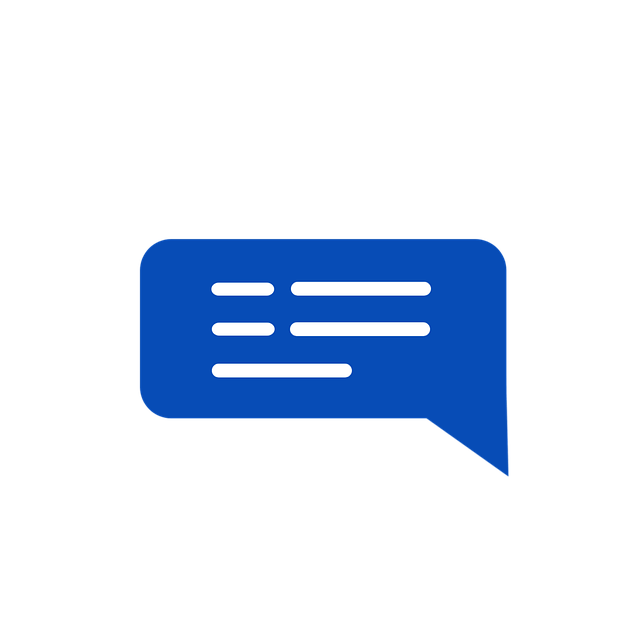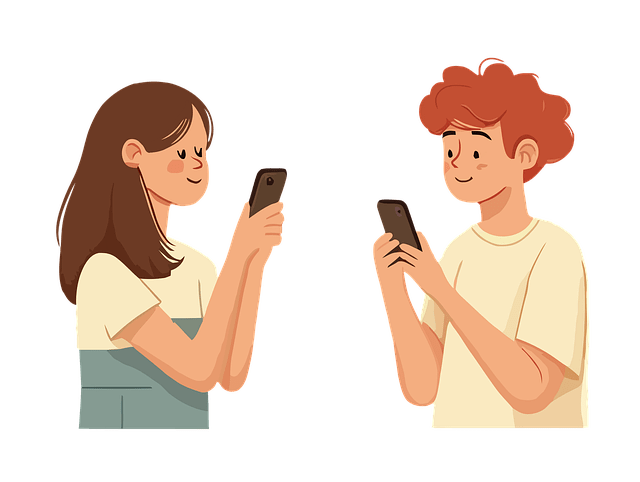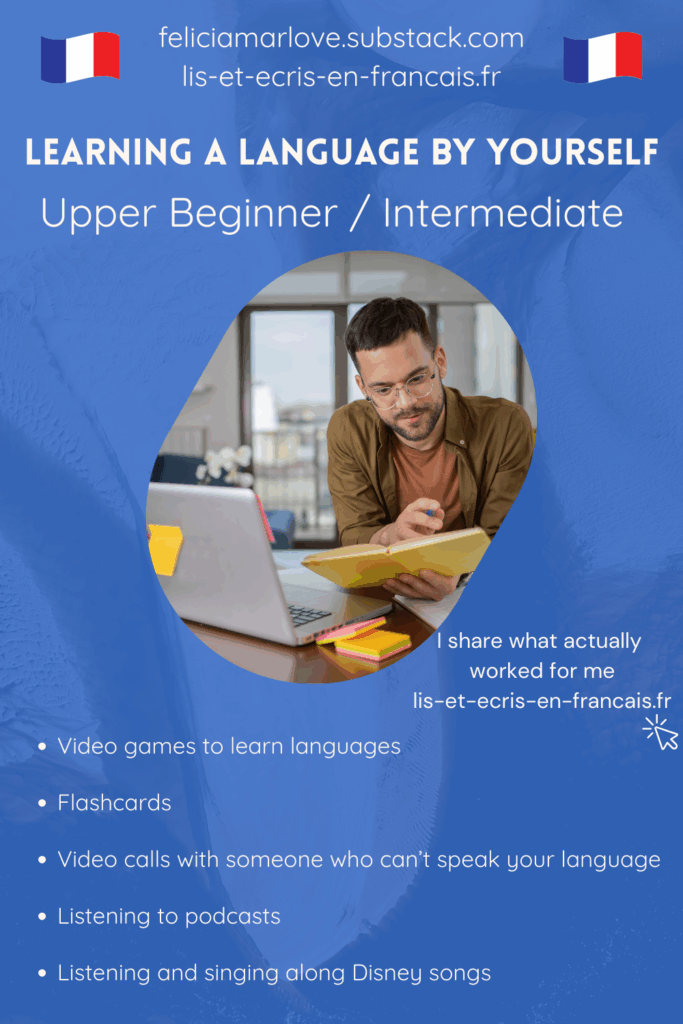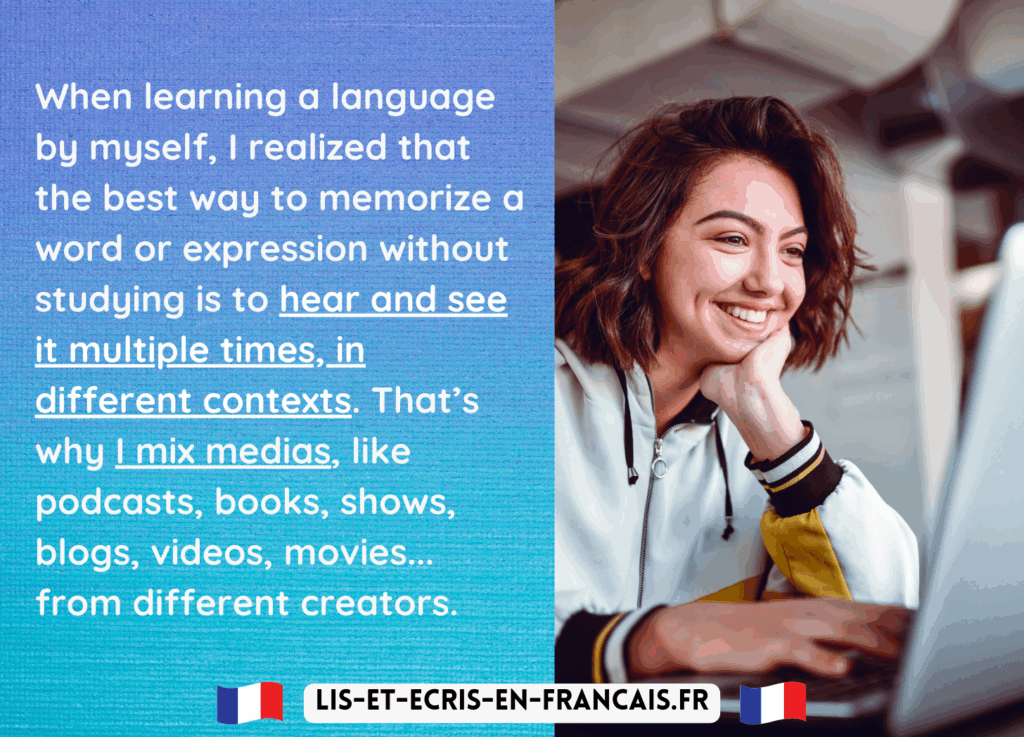In the first post of this series, I explained how I started learning a language by myself, without going to school and taking private lessons. I started with mobile apps to learn the basics, I wrote vocab lists and grammar rules (and tried to review them regularly… ish…), and even attempted to read children books in that language.
If you missed it, it’s detailed in my post about how I started learning a new language on my own. In this post, I’ll explain how I moved from the beginner’s level.
Hey, did you know all my posts are available in French? If you’re learning French with the comprehensible input method (aka language acquisition or immersion), I encourage to try reading them in their original French version, then use the English version if needed. Please note the English version is not a literal translation.
Video games to learn foreign languages
I tested video games developed purposely to learn a new language. The goal of those games if primarily to learn vocabulary thanks to repetition. I got bored quickly because the games were not very interesting or fun. Just as vocab lists I mentioned in my post about how I started studying a new language, repeating words without context was not very efficient.
My opinion on video games to learn a language
This kind of game might be useful in the beginning, just like mobile apps. It helps remembering a few words. In my case, it was also helpful because the language I’m learning uses a different alphabet from my mother tongue, and at first I had to learn those symbols by heart.
But as soon as I had learned the basis of that language and a few common words, games felt useless. It’s better to find games you actually like, with comprehensible dialogs, and to play the game as you would normally. However, that’s a more intermediate/advanced technique.
Registering for an official exam
At some point, it was hard for me to keep my motivation and work on this new language a few times a week, although I really wanted to get better. I decided to register for an official exam so it would force me to study! I chose a level above the one I had so I had to work to pass it.

Learn how to think in French, discuss faster and more fluently, and write in a natural, modern French!

It did force me to study more. In six months, my level went up, and I passed the exam. However, it also caused a lot of stress because the time frame was pretty short, taking into account what I had to learn to reach the level of the exam.
Thanks to that exam, I got used to working more often, and succeeded motivated me to continue improving.
On the other hand, I realized afterwards that studying for those exams forces you to study content that is not necessarily useful, depending on your goal.
The exam that was available to me was a written one, mainly testing reading and hearing comprehension, so I couldn’t test my expression in the language. It didn’t help me speak better, while I wanted to be able to have short conversations once I travel where the language is spoken.
My opinion on official exams as a way to motivate you to study a language
I think it’s a good technique for people who have a hard time organizing their work and finding motivation. Once registered, you don’t have much choice but to study steadily. If you don’t like failing exams, it’s a good motivator.
However, passing an exam and discussing with people in that language are two very different things.
Taking lessons with someone who only speaks the language you’re learning🌟⚠️
To help me pass the exam, I had one hour one-on-one video lesson per week. My “teacher” could not speak any language I knew, except the one I was learning, so I had no choice but to talk in that language with her.
It was really difficult because I was still a beginner at the time. Sometimes, I understood nothing at all and it was frustrating. I think my instructor could not handle someone with such a low level as mine at the time, which made it difficult to learn from our sessions. However, I didn’t want to look for someone else, as I only had 6 months to study for my exam, so I stuck with her.
My opinion on online courses with someone only talking the language we’re learning
Those sessions, although very difficult, allowed me to memorize things that I still remember to this day, thanks to situations I encountered during our lessons. But it was really draining to attend those courses.
I think it’s really important to choose an instructor who’s able to adapt their level to yours, because you should be able to understand most of what is said to stay motivated and to be able to learn from it.
Flashcards
Flashcards are cards with two sides, one with the word to learn, the other with its translation and pronunciation.
There are also online solutions to create virtual flashcards. I personally used physical ready-to-use flashcards. They were divided in to levels, which was convenient because I could focus on the ones useful for the exam I intended to pass.
You have to use flashcards everyday, reviewing them again and again. At first, it worked well, but after a certain amount of cards, it got complicated to memorize more words. I also noticed that I wasn’t always recognizing those words when I saw them in a text, although I was able to recognize it when using flashcards.
My opinion on flashcards
I think it’s another solution suited for early beginnings, in order to quickly learn a lot of basic vocabulary, but it gets boring and is less and less efficient with time.
Moreover, that’s another method where you learn words without a context, and it doesn’t necessarily help to recognize those words when you see them in a natural context.

Listening to podcasts in another language🌟
When traveling abroad, you’ll mainly need to speak with people and understand what they say. To improve hearing comprehension, I started listening to podcasts in the language I’m learning.
It was difficult finding podcasts with the right level. Some speakers speak very slowly but their way of speaking is unnatural, and I don’t like how it sounds. Other speaks are too fast or don’t articulate well.
I had to try a lot of podcasts until I could find a few that were aligned with my level at the time, not too easy nor too difficult.
I don’t understand all the words being said, I sometimes even don’t understand all sentences, but that’s all right. The most important is being able to understand the episode as a whole, and to discover a few new words or expressions every time.
What works great for me is hearing the same word or expression in various podcasts, over a period of a few days. That’s how I memorize the best! That’s why I also consume a lot of different medias, like podcasts, videos, show, books, blogs… but also subscribed to several podcasts.
My opinion on podcasts
I find it really efficient and I totally recommend it! The difficult part is finding the right podcasts, according to your level. What I really like with this method is that you can be listening everywhere, even when doing sport, cooking… You don’t need to have your hands free, and you can combine with an activity that doesn’t require (much) brain power.

Listening to Disney songs in a foreign language🌟
I’m not especially a Disney fan, but I found out that their songs are translated in many languages and they are quite easy to understand. I think it’s easier to understand than native children’s song, for the same reason I think books for children are difficult to understand.
Songs for children often use a different way of speaking than content made for adults, and kids singing those songs have a different way of expressing compared to people you’d meet in another context. Disney songs are sung by adults and use a pretty grown-up vocabulary.
I added my favourite ones to my Spotify playlist. The more I listen to them, the more I understand. I helps memorize words and expressions with a context. Little by little, I even started singing some parts of the song when they play.
Sometimes, I listen to the same song again and again, trying to write down what I understand and to translate it the best I can, then compare with the actual lyrics.
My opinion on Disney songs to learn a foreign language
I think it’s surprisingly efficient! I would encourage you to try it, even if you’re not a fan. It’s great to practice hearing comprehension, in addition with spoken content like podcasts. And if you do like Disney and know some of the lyrics in your own language, it makes it even easier!
Bonus, if you’re learning French, here’s the playlist of the most popular Disney songs in French on Youtube :
And a playlist mostly in French on Spotify :
Which of these methods have you already tried, and what do you want to add to your study routine?
Read Part 3 : Learning a language on my own, from intermediate to upper intermediate